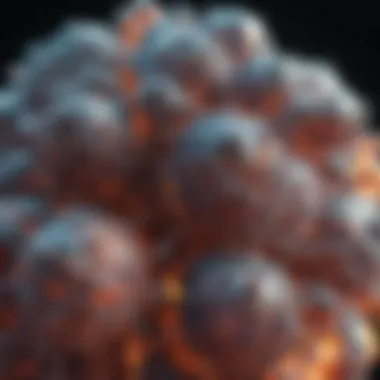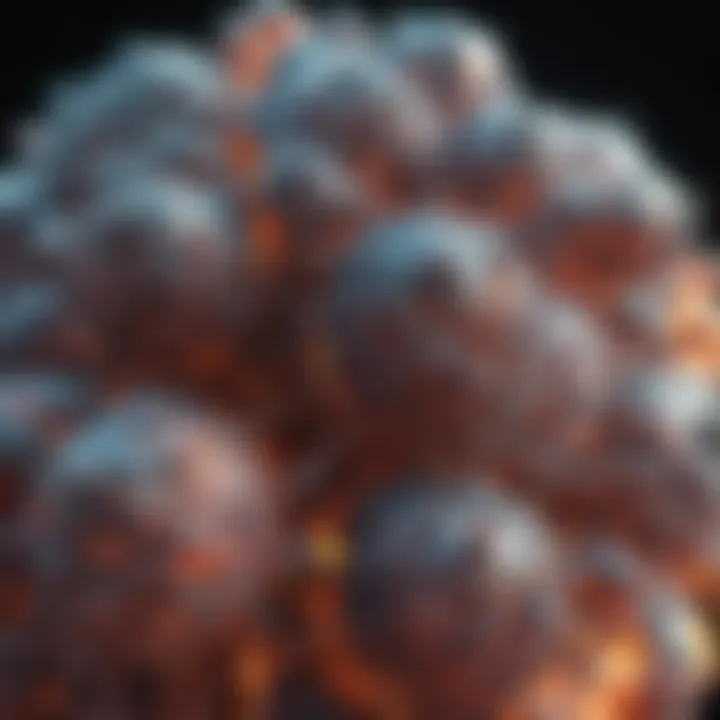Exploring CD3 Antibodies: Mechanisms and Applications


Intro
CD3 antibodies are a vital component in the realm of immunotherapy, particularly in the engagement and activation of T-cells. These monoclonal antibodies target the CD3 receptor complex, which plays a crucial role in the T-cell activation process. Their significance extends into various clinical applications, addressing conditions such as autoimmune disorders and different forms of cancer, notably leukemia and lymphoma. This exploration of CD3 antibodies focuses on their mechanisms, applications, and the trajectory of future research initiatives.
In the healthcare sector, understanding the mechanisms by which CD3 antibodies exert their effects is essential. Not only do they interact with T-cells, but they also influence the overall immune response. Exploring these processes helps elucidate their therapeutic potential. The ongoing advancements in the understanding of these antibodies suggest promising avenues for new treatments and clinical protocols.
Furthermore, examining the applications of CD3 antibodies reveals their current usage across various medical fields. Their role in activating T-cells can enhance the body’s immune response against tumors or help re-establish tolerance in autoimmune diseases. Given the expanding evidence about the efficacy of CD3 antibodies, it is imperative to analyze both the theoretical implications and the practical applications in real-world settings.
The following sections will delve deeper into the methodologies used to advance the research on CD3 antibodies, as well as discussions that will compare this research against existing theories, aiming to clarify the potential future directions in this field.
Foreword to CD3 Antibodies
CD3 antibodies hold substantial significance in the field of immunology, particularly due to their role in modulating T-cell responses. Their ability to activate T-cells is crucial for developing therapeutic strategies against a variety of diseases. The exploration of CD3 antibodies unveils the mechanisms through which T-cells can be harnessed, highlighting their potential impact on patient outcomes in both cancer therapy and autoimmune disorders.
Definition and Structure
CD3 antibodies target the CD3 complex, which is present on T-cells. The CD3 complex consists of several proteins that are integral to T-cell receptor signaling. Each CD3 antibody binds to specific domains within this complex, enabling the T-cell activation process. Structurally, these antibodies can vary, but they often feature regions that enhance their binding to T-cells, facilitating potent immune responses.
Understanding the definition and structure of CD3 antibodies is vital. It illuminates how these antibodies interact with the immune system, allowing for more targeted therapies. Their structure usually consists of an IgG backbone, which is common among monoclonal antibodies, and includes various heavy and light chains designed for specificity. This intricate design plays a crucial role in their biological function.
Historical Perspectives
The journey of CD3 antibodies began in the late 1970s with advances in monoclonal antibody technology. Researchers first isolated CD3 antibodies from mouse models and soon realized their potential in the field of immunotherapy. This initial discovery laid the groundwork for a more in-depth understanding of the T-cell activation pathway.
Over the decades, CD3 antibodies have evolved significantly. Early use was largely limited to experimental settings, but as productions improved, their application began to reach clinical trials. Notable milestones include the development of OKT3, the first humanized anti-CD3 monoclonal antibody, which represented a significant breakthrough in solid organ transplantation. Through historical scrutiny, we observe a pattern of increasing refinement, leading to modern applications and an ever- broadening therapeutic landscape.
In summary, the foundation laid by these historical advancements provides context for current research efforts, helping to elucidate the enduring importance of CD3 antibodies in immunological applications.
Mechanisms of Action
Understanding the mechanisms of action of CD3 antibodies is crucial for their effective application in immunotherapy. CD3 antibodies primarily target the CD3 component, which is essential in orchestrating T-cell responses. By enhancing T-cell activation, these antibodies play a significant role in initiating immune responses against various diseases, particularly cancers and autoimmune disorders. This section explores key aspects concerning the mechanisms by which CD3 antibodies exert their effects.
T-Cell Receptor Complex
The T-cell receptor (TCR) complex is pivotal in the initiation of T-cell activation. It comprises the CD3 subunits, which are crucial for transmitting signals following antigen recognition. When a specific antigen binds to the TCR, the CD3 proteins respond by undergoing conformational changes, leading to intracellular signaling cascades.
CD3 antibodies range from promoting T-cell proliferation to enhancing cytotoxic activity against tumor cells. This occurs because the binding of these antibodies may mimic natural antigen engagement, effectively cross-linking CD3 receptors and activating downstream signaling pathways. As a result, T-cells can respond more robustly and efficiently to tumors and infected cells.
Signal Transduction Pathways
Upon T-cell activation, multiple signaling pathways are engaged. Most important are the PI3K-AKT and MAPK pathways. These pathways govern various cellular responses, including growth, proliferation, and survival.
CD3 antibodies can potentiate these pathways. By doing so, they aid in pushing the T-cell response towards greater activity. For instance, enhanced PI3K signaling leads to increased glucose uptake and energy metabolism in T-cells. This aspect is particularly beneficial during an immune response when T-cells require more energy.
In addition to this, the activation of nuclear factor kappa B (NF-κB) via the CD3 structure further stimulates important cytokine release, thus amplifying the immune response. Each of these pathways contributes to the overall effectiveness of CD3 antibodies as therapeutic agents.
Cytokine Release and Immune Activation
CD3 antibodies also play a significant role in the release of cytokines, which are critical regulators in the immune system. When activated, T-cells secrete various cytokines such as IL-2, IFN-γ, and TNF-α. These cytokines act to coordinate the broader immune response, enhancing the activities of not only T-cells but also other immune cell types.
The cytokine milieu generated as a result of CD3 antibody engagement can influence the entire tumor microenvironment. For example, increased IFN-γ can promote the anti-tumor immune response while also attracting immune effector cells to the site of interest. Thus, the role of CD3 antibodies in cytokine release is an essential consideration for their use in therapeutic settings.
Overall, the mechanisms of action by which CD3 antibodies function involves complex interplays of TCR signaling, signal transduction pathways, and cytokine dynamics. Understanding these mechanisms not only highlights how CD3 antibodies operate but can also inform future therapeutic strategies.
Clinical Applications of CD3 Antibodies


The clinical applications of CD3 antibodies are pivotal in addressing various medical challenges. CD3 antibodies, by binding to the CD3 complex on T cells, significantly enhance T-cell activation and proliferation. This attribute is foundational in their utility across multiple therapeutic areas. The importance of understanding their applications cannot be overstated, as these antibodies contribute to groundbreaking treatments in conditions such as cancer, autoimmune disorders, and in transplantation medicine.
Cancer Immunotherapy
Cancer immunotherapy employs CD3 antibodies to facilitate an immune response against tumor cells. These antibodies can redirect T cells to engage with tumor antigens effectively. A prominent example is Teplizumab, which has shown promise in targeting specific cancers, including leukemia and lymphomas. The binding of CD3 antibodies to the T-cell receptor assists in inducing a robust cytotoxic response against malignant cells.
- Benefits
- Enhances specific immune responses against tumors.
- Potentially reduces the risk of metastasis through T-cell activation.
Despite these benefits, there are important considerations such as the potential for associated cytokine release syndrome. Thus, ongoing research is vital in optimizing treatment protocols and managing adverse effects.
Autoimmune Disorders
In autoimmune conditions, where the immune system attacks the body’s own tissues, CD3 antibodies represent a strategic approach to modulate the immune response. One notable product is OKT3, initially utilized for preventing graft rejection. This application helps reduce the activity of autoreactive T cells, thereby alleviating symptoms associated with autoimmune diseases. The mechanism by which CD3 antibodies induce T-cell apoptosis or anergy plays a crucial role in this process.
- Considerations
- Monitoring for rebound autoimmune activity when therapy stops.
- Careful patient selection to minimize risks.
Transplantation Medicine
In the realm of transplantation, CD3 antibodies are invaluable in preventing organ rejection. They are often used during the induction phase of immunosuppressive therapy. Their ability to deplete T cells or alter T-cell function is essential in achieving successful graft outcomes. Notably, the use of Basiliximab as an induction agent exemplifies this application. It minimizes the risk of acute rejection while promoting long-term graft survival.
- Benefits
- Facilitates better short-term and long-term graft acceptance.
- Reduces reliance on corticosteroids.
Development and Production of CD3 Antibodies
The development and production of CD3 antibodies is fundamental to advancing therapeutic interventions in immunology. The ability to produce these antibodies efficiently enables researchers and clinicians to harness their power in treating various diseases. This section explores the methodologies involved, highlighting both the technical details and broader implications of these processes.
Hybridoma Technology
Hybridoma technology is a cornerstone in the generation of monoclonal antibodies, including CD3 antibodies. This process begins with the immunization of mice with the target antigen. In the case of CD3, T-cell receptors are the focus, stimulating a robust immune response. Once the immune response is established, B-cells are extracted from the spleen of the immunized mice.
These B-cells are then fused with myeloma cells, which are immortalized cancer cells that allow for the continuous growth of the hybrid cells, or hybridomas. This fusion produces cells that can both proliferate indefinitely and produce the desired antibody. The hybridoma cells are screened for their ability to produce antibodies specific to the CD3 antigen.
Key benefits of hybridoma technology include the generation of a stable cell line that continuously produces a uniform antibody product. However, this method requires careful selection and validation to ensure that the antibodies produced are of high quality and suitable for clinical applications.
Recombinant DNA Technology
Recombinant DNA technology represents a significant advancement in the production of CD3 antibodies. This method involves inserting the gene coding for the desired antibody into host cells, typically mammalian or bacterial cells. This enables the mass production of antibodies while allowing for modifications that can enhance efficacy or reduce adverse effects.
Using recombinant DNA allows for greater control over the antibody's characteristics, including humanization processes that reduce immunogenicity in patients. The resulting monoclonal antibodies can exhibit improved binding affinities and better pharmacokinetics compared to traditional methods. The flexibility of this technology accelerates the development timeline and expands the potential for creating novel therapies targeting CD3.
Quality Control and Regulation
Quality control is a critical aspect of the development and production of CD3 antibodies. Regulatory bodies such as the U.S. Food and Drug Administration (FDA) have established stringent guidelines to ensure the safety and efficacy of biological products. This includes rigorous testing for purity, potency, and stability throughout the manufacturing process.
Quality control encompasses several layers of testing, including:
- In-process testing: Monitoring the production process to ensure each step results in products that meet pre-defined standards.
- Final product testing: Comprehensive analysis of the final CD3 antibodies to confirm their identity, strength, and safety.
- Stability studies: Assessing how the antibody maintains its efficacy over time and under various conditions.
Compliance with these regulations is essential not only for gaining market approval but also for maintaining public trust in monoclonal antibody therapies.


Efficacy and Safety Considerations
The evaluation of efficacy and safety is crucial when considering CD3 antibodies for therapeutic use. This topic examines how well these antibodies work in achieving desired clinical outcomes, while concurrently assessing any risks or adverse events associated with their use. A thorough understanding of both efficacy and safety helps in making informed decisions regarding their application in various disease contexts.
Clinical Trial Outcomes
Clinical trials provide essential data on the effectiveness and safety of CD3 antibodies. These trials assess their therapeutic potential in conditions like cancer and autoimmune diseases. The outcomes of these studies often determine their approval for clinical use.
In pivotal studies for monoclonal antibodies, endpoints frequently include overall survival rates, progression-free survival, and response rates to treatment. For instance, studies involving OKT3 (muromonab-CD3) have shown its capacity to induce T-cell activation and reduce graft rejection in transplantation medicine. Outcomes can also vary significantly across different populations, leading to tailored treatment strategies.
Furthermore, results from clinical trials help establish the relative efficacy of CD3 antibodies compared to traditional treatments. Documentation and evaluation of these outcomes are necessary for refining clinical guidelines and advancing therapeutic protocols.
Adverse Effects and Management
While CD3 antibodies can be highly effective, their use is not without risks. Adverse effects must be taken seriously as they can influence patient adherence to treatment and overall quality of life. Common adverse effects may include infusion reactions, cytokine release syndrome, and potential impacts on T-cell function.
Management of these side effects often involves premedication protocols or the use of additional therapies to mitigate reactions. For instance, managing cytokine release syndrome may require corticosteroids or other immunosuppressive agents to alleviate symptoms. Effectiveness and monitoring protocols for adverse events are a critical component of any treatment regimen using CD3 antibodies.
Effective management of adverse effects enhances treatment adherence and improves patient outcomes.
In summary, understanding clinical trial outcomes and systematically addressing adverse effects associated with CD3 antibodies are integral to their overall efficacy and safety profile. Conducting well-designed clinical studies and adjusting treatment strategies based on patient responses can help maximize benefits while minimizing risks.
Challenges in CD3 Antibody Therapy
The use of CD3 antibodies in therapy presents critical challenges that must be addressed to maximize their efficacy. Understanding these challenges is essential for both researchers and clinicians working in this field. Resistance mechanisms in tumor cells and complications in autoimmune treatments are two significant areas where issues arise. Addressing these concerns can lead to better patient outcomes and more effective therapies.
Resistance Mechanisms in Tumor Cells
One major challenge is the emergence of resistance mechanisms in tumor cells. Over time, malignant cells can evolve to evade the effects of CD3 antibodies. This resistance occurs through various biological pathways. For instance, some tumor cells may downregulate the expression of CD3 or related molecules on their surface. This reduction can significantly weaken T-cell activation, which is the desired effect of CD3 therapies.
"Understanding the resistance mechanisms is crucial for improving the therapeutic application of CD3 antibodies in oncology."
Moreover, mutations in signaling pathways can also contribute to this resistance. Tumor cells may acquire mutations that allow them to survive despite persistent CD3 antibody treatment. These alterations can lead to enhanced survival signals and decrease susceptibility to apoptosis, which is a primary goal of antibody therapy.
Additionally, the tumor microenvironment can play a role in resistance. The presence of immunosuppressive cells, such as regulatory T cells or myeloid-derived suppressor cells, can inhibit T-cell efficacy. These cells can hinder the action of CD3 antibodies by dampening the immune response, thus complicating treatment strategies.
Addressing these resistance mechanisms requires innovative approaches. Combination therapies that include checkpoint inhibitors or other modalities may enhance the efficacy of CD3 antibodies. Research into personalizing treatment based on the specific tumor microenvironment is also crucial in overcoming these challenges.
Complications in Autoimmune Treatments
In the realm of autoimmune disorders, the application of CD3 antibodies faces its own set of complications. The primary aim of these therapies is to modulate the immune response. However, achieving a balance in immune suppression is challenging. Excessive immune modulation can lead to increased vulnerability to infections or even the exacerbation of other autoimmune symptoms.
Another complication arises from the variability in patient response. Individual genetic differences can affect how patients metabolize and respond to CD3 antibodies. This variability means that a one-size-fits-all approach is often inadequate. Personalized medicine approaches must be developed to identify which patients will benefit most from this therapy.
Monitoring adverse effects is crucial in the context of autoimmune treatments. Patients treated with CD3 antibodies might experience cytokine release syndrome, which can lead to significant side effects. Awareness and management of these complications are necessary to improve patient safety and therapy adherence.
Innovations in CD3 Antibody Research
Innovations in CD3 antibody research are essential for advancing therapeutic applications and improving patient outcomes. As the understanding of immunology deepens, the modification and application of CD3 antibodies in new contexts with enhanced efficacy have garnered significant attention. Researchers aim to leverage these innovations to address challenges in immunotherapy, expand treatment options, and minimize potential side effects associated with existing therapies.
Modifications of Antibody Structures
Modifying the structure of CD3 antibodies is crucial for enhancing their functionality. These modifications might include changing the Fc region to alter the antibody's half-life or improving its ability to recruit immune effector cells. By doing this, researchers can achieve a more effective T-cell response while minimizing toxicity.
Some notable modifications involve:
- Isotypes switching to enhance engagement with Fc receptors.
- Humanization of murine antibodies to reduce immunogenicity in humans.
- Addition of glycosylation patterns to improve stability and bioavailability.


By considering these elements, scientists can design CD3 antibodies that are not only more effective but also safer for patient use. This line of research continues to expand, presenting opportunities for sophisticated and tailored therapies.
Combination Therapies with Other Modalities
Combination therapies involving CD3 antibodies and other treatment modalities represent a promising direction in oncology and immune diseases. By packaging different treatment mechanisms, it is possible to enhance the overall therapeutic effect.
For example, combining CD3 antibodies with checkpoint inhibitors can synergistically boost T-cell activation and proliferation. Furthermore, pairing with small molecule inhibitors may help to overcome resistance mechanisms that tumors often develop against monoclonal antibodies. The advantages of combination therapies include:
- Increased efficacy in targeting malignancies.
- Reduction in treatment resistance, enhancing durability of responses.
- Potentially lower doses of individual drugs
This approach encourages a more holistic and integrated view of cancer immunotherapy and autoimmune disorder management, fostering a deeper understanding of the immune landscape.
Emerging Trends in Biologics
There are several emerging trends in the field of biologics that could influence CD3 antibody research. These trends may revolutionize therapeutic strategies and patient care. Among them, the continuous exploration of bispecific antibodies has gained prominence. Bispecific CD3 antibodies can engage T cells while simultaneously targeting a tumor-associated antigen, resulting in more effective tumor cell lysis. Another significant trend involves the development of CAR-T cell therapies that utilize elements of CD3 signaling. By reprogramming T cells with a CD3 antibody component, this strategy offers a route to enhance T-cell efficacy against various cancers.
The key points to consider in this context:
- Focus on designing pathway-specific biologics to limit unintended immune activation.
- Utilization of nanotechnology to improve targeting and reduce off-target effects.
- Increase in investment towards understanding the pharmacodynamics and pharmacokinetics of novel drug structures.
These ongoing advancements highlight not only the potential of CD3 antibodies but also the evolving landscape of immunotherapy overall, making it essential for researchers and practitioners to remain informed of such innovations.
"The future of CD3 antibody research holds remarkable promise as we explore new frontiers in immunotherapy. Innovations pave the way for more effective and personalized treatments while addressing the challenges of the immune system."
In summary, innovations in CD3 antibody research are vital for transforming our approach to diseases that rely on immune mechanisms. As we advance our understanding of antibody modifications, combination therapies, and the broader field of biologics, the potential to enhance therapeutic efficacy and improve patient outcomes becomes increasingly attainable.
Future Directions for Research
Future research on CD3 antibodies is crucial for advancing therapeutic strategies and improving patient outcomes. The potential for CD3 antibodies spans across various fields, including oncology, immunology, and personalized medicine. This section will explore key aspects that shape future directions in CD3 antibody research, highlighting the importance of innovation and the need for a broader understanding of the immune system's interactions with these therapeutic agents.
Next-Generation Therapeutics
Next-generation therapeutics involving CD3 antibodies are being developed to enhance efficacy and reduce side effects. These therapeutics aim to modify existing antibodies for better specificity and reduced immunogenicity. For instance, researchers are investigating the design of bispecific antibodies that can engage multiple targets simultaneously. This approach could lead to increased T-cell activation and tumor cell targeting without compromising safety.
Additionally, improvements in delivery systems may also play a significant role. For example, nanoparticles might be used to deliver CD3 antibodies more effectively to specific sites within the body, further enhancing their therapeutic potential. Such innovations could revolutionize how CD3 antibodies are utilized in clinical practice and lead to more successful treatment regimens.
Personalized Medicine Approaches
The rise of personalized medicine has significant implications for CD3 antibody research. Tailoring therapies to individual patient profiles can enhance treatment effectiveness and minimize adverse reactions. This involves not only genetic profiling but also understanding the patient's immune system characteristics.
By identifying specific biomarkers associated with better responses to CD3 antibodies, clinicians can select the most appropriate treatment plans for their patients. Moreover, advances in genomics can provide insights into tumor-specific characteristics, enabling the development of more customized therapies that leverage the power of CD3 antibodies effectively.
Global Health Considerations
Finally, global health considerations are essential in shaping the future of CD3 antibody research. Ensuring access to these therapies in low- and middle-income countries is critical. Researchers and pharmaceutical companies must work together to create cost-effective solutions that can reach populations in need.
Efforts should focus on reducing production costs and improving distribution channels. Furthermore, educating healthcare providers and patients about the benefits of CD3 antibodies can help increase their utilization worldwide.
The integration of CD3 antibodies into a global health strategy not only addresses cancer and autoimmune disorders but also elevates the overall understanding of immunotherapies across diverse populations.
End
In this concluding section, we shall reflect on the significance of CD3 antibodies. These molecules play a crucial role in activating T-cells, thus contributing greatly to our understanding of immune response and therapeutic avenues. As we navigate the complexities of immunology, CD3 antibodies emerge as not only pivotal tools in cancer immunotherapy but also as promising candidates in treating autoimmune disorders. The ongoing advancements in research indicate that there’s much more to explore regarding their mechanisms and mechanisms.
Summary of Key Points
- CD3 antibodies are instrumental in the activation of T-cells. Their interaction with the T-cell receptor complex enhances immune response.
- They are currently being utilized in diverse clinical applications, specifically in cancer treatment and managing autoimmune diseases.
- The production and regulation of CD3 antibodies involve sophisticated technologies such as hybridoma and recombinant DNA technology.
- Challenges remain, including tumor resistance and potential adverse effects in treatments.
- Future research directions indicate a focus on next-generation therapeutics and personalized medicine, which could refine treatment approaches and improve patient outcomes.
Implications for Science and Medicine
The implications of CD3 antibodies extend far beyond their current applications. They represent a gateway to not only improving existing therapies but also pioneering innovative strategies in immunology and therapeutic interventions.
In cancer treatment, CD3 antibodies are changing how oncologists approach the disease. They offer a pathway to harness the body's immune system, potentially leading to more effective and less harmful treatments.
From a broader scientific perspective, research in CD3 antibodies can illuminate fundamental processes in immunology. Insights gathered from ongoing research might lead to breakthroughs that improve our understanding of the immune system's functions and its integral role in overall health.
In summary, the exploration of CD3 antibodies underscores their significance in contemporary and future medical research. Their ability to activate T-cells provides a robust mechanism for therapeutic application, indicating a promising landscape for future endeavors in immunotherapy.



